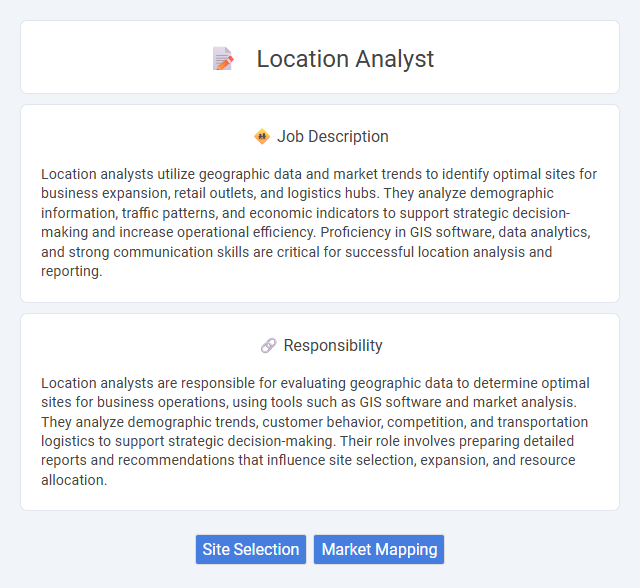
Location analysts utilize geographic data and market trends to identify optimal sites for business expansion, retail outlets, and logistics hubs. They analyze demographic information, traffic patterns, and economic indicators to support strategic decision-making and increase operational efficiency. Proficiency in GIS software, data analytics, and strong communication skills are critical for successful location analysis and reporting.
Individuals with strong analytical skills and attention to detail are likely suitable for a Location Analyst position, as the role demands evaluating geographic data to determine optimal business sites. Those who enjoy working with maps, spatial data, and demographic trends may find the job particularly fitting, while people uncomfortable with data interpretation or complex problem-solving might face challenges. The position probably requires adaptability and critical thinking to assess diverse conditions, making it more compatible with candidates who thrive in data-driven environments.
Qualification
A Location Analyst typically requires a bachelor's degree in geography, urban planning, statistics, or a related field with strong analytical and spatial data skills. Proficiency in Geographic Information Systems (GIS), data visualization tools, and statistical analysis software is essential. Experience in market research, demographic analysis, and commercial real estate enhances the ability to evaluate site viability and support strategic decision-making.
Responsibility
Location analysts are responsible for evaluating geographic data to determine optimal sites for business operations, using tools such as GIS software and market analysis. They analyze demographic trends, customer behavior, competition, and transportation logistics to support strategic decision-making. Their role involves preparing detailed reports and recommendations that influence site selection, expansion, and resource allocation.
Benefit
A Location Analyst role likely offers significant benefits by providing opportunities to influence strategic business decisions through data-driven insights on geographic market potential. This job may enhance skills in spatial analysis, market research, and GIS tools, which are valuable across various industries. Probable benefits also include working in collaborative environments where analytical findings can directly impact company growth and operational efficiency.
Challenge
The challenge of a Location Analyst job likely centers around accurately evaluating geographic data to determine optimal sites for business operations, which requires balancing multiple variables such as demographic trends, market competition, and logistics costs. The role probably demands strong analytical skills to interpret complex datasets and predict potential site performance, often under tight deadlines and shifting market conditions. Navigating uncertainty in market dynamics and regulatory environments might also pose significant difficulties in making data-driven recommendations.
Career Advancement
Location analysts specialize in geographic data to identify optimal sites for business operations, driving strategic growth decisions. Mastery of GIS tools, market analysis, and demographic research enhances their value, positioning them for roles such as Senior Location Analyst or Location Strategy Manager. Advancing in this field often involves expanding expertise in data analytics, urban planning, and cross-functional team leadership.
Key Terms
Site Selection
A Location Analyst specializing in site selection evaluates geographic, demographic, and economic data to identify optimal locations for business expansion or new store openings. They analyze factors such as customer density, competitor presence, traffic patterns, and real estate costs to ensure strategic alignment with business goals. Effective site selection increases operational efficiency, maximizes profitability, and supports long-term growth initiatives.
Market Mapping
Location analysts specializing in market mapping leverage geographic information systems (GIS) and spatial data analysis to identify optimal locations for retail stores, warehouses, and service centers. They evaluate demographic trends, competitor presence, consumer behavior, and transportation accessibility to support strategic business expansion and site selection. Proficiency in data visualization tools and market intelligence platforms enhances their ability to translate complex datasets into actionable insights for maximizing market potential.
 kuljobs.com
kuljobs.com